SCARABEUS project featured on Cordis
As a consortium, we are extremely proud of this achievement, and we remain committed to driving innovation that transforms and sustains our world.
As a consortium, we are extremely proud of this achievement, and we remain committed to driving innovation that transforms and sustains our world.
We are proud to unveil the new leaflet of SCARABEUS project, summarising the main outcomes our consortium has achieved in the last 5 years.
We are very glad to announce that the presentations of the 5th webinar on R&D Activities on sCO2 Activities in Europe are now available for download.
Organised by ETN Global, coordinator of the CO2OLHEAT Project, this last event was focused on expander technology. Expanders pose the twofold challenge of achieving high efficiency and contain extreme pressures and temperatures, whilst also requiring new sealing technology that is different from that used in steam and gas turbines. These topics were covered in three very interesting, complementary talks by industry representatives:
Follow this link to get your copy of the presentations and video: Link
The SCARABEUS project was well represented by researchers from University of Seville at the 7th International Seminar on Organic Rankine Cycle (ORC) Power Systems, held in Seville between September 4th and 6th.
Two papers were presented at the conference, dealing with different aspects of supercritical cycles working on Carbon Dioxide mixtures in Concentrated Solar Power applications:
Abstract
Although the thermodynamic potential of transcritical/supercritical CO2-based power cycles for next generation Concentrated Solar Power plants has been already confirmed in literature, further investigation to assess the actual feasibility of this technology from a techno-economic standpoint is needed. In fact, large uncertainty is found when it comes to the estimation of the CAPEX and OPEX of the power block, and the same can be said for the solar subsystem when high Turbine Inlet Temperatures are considered (>700 ºC).
Bearing this in mind, this paper presents a methodology to map the techno-economic potential of next-generation Concentrated Solar Power plants running on CO2-based mixtures, with the final aim to identify the threshold (breakeven) costs of the main subsystems enabling a clear gain in terms of Levelised Cost of Electricity with respect to state-of-the-art steam-based CSP.
Two different systems are studied which differ in the composition and peak temperature of the Heat Transfer Medium: a SoA molten salts system operating at a TIT of 550 ºC (Gen I) and a solid particle system with TIT=700 ºC (Gen II). An integrated platform able to simulate all CSP plant subsystems and perform hourly calculations is built in Matlab employing Artificial Neural Networks to simulate the solar field, ensuring extremely high computational speed.
To overcome the high uncertainty in terms of cost estimation, a two-step analysis is developed: firstly, the CAPEX of the entire plant is calculated assuming correlations from literature, except for the power block, whose estimate brings about the largest uncertainty. As a result, the minimum power block cost allowing a LCoE lower than a certain target is identified. Secondly, an inverse methodology is applied, setting the power block cost and assessing the minimum CAPEX of the solar subsystem. As a result, a map is obtained showing the target CAPEX to be accomplished by sCO2+CSP if a clear reduction of the LCoE of this technology is to be achieved
Abstract
This research, developed in the framework of the SCARABEUS project, studies the off-design performance of transcritical power cycles running on CO2-SO2 mixtures in Concentrated Solar Power applications. The objective of this work is to identify optimum operational strategies that maximise net energy production when exposed to variable ambient temperature, with special focus on the operation of the Heat Rejection Unit (Air-Cooled Condenser). The power cycle is simulated in Thermoflex, modified with user-defined scripts to account for the specific off-design performance characteristics of key components. The Air-Cooled Condenser is modelled by means of an in-house Matlab tool, already validated in previous publications, able to accurately simulate the heat transfer process between working fluid and cooling medium (air) and to calculate auxiliary power consumption.
Four different strategies are identified, depending on ambient temperature: variable or constant condensation pressure for ambient temperatures lower than the design value, and constant turbine inlet temperature or constant return temperature of the heat transfer fluid for ambient temperature higher than design value. The results show that a combination of variable and constant minimum cycle pressure is the best alternative for low ambient temperatures, enabling net system efficiencies higher than 41%. On the other hand, constant turbine inlet temperature enables higher net performance than constant return temperature of the heat transfer fluid, even if at the expense of a reduction in energy storage capacity for the same inventory of molten salts
The papers will be published in the Conference Proceedings and they will be available for download free of charge. Congratulations SCARABEUS team at University of Seville on this excellent dissemination action!
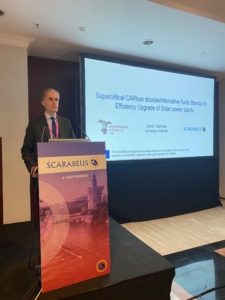
Prof. David Sánchez, Dissemination Coordinator of SCARABEUS
As announced in recent months, a final dissemination event was organised by the SCARABEUS project team with the aim to disclose the most relevant results and outcomes of the project. The event was collocated with the 7th International Seminar on Organic Rankine Cycle (ORC) Power Systems, held in Seville between September 4th and 6th. This conference takes place every two years, organised by the Knowledge Centre on Organic Rankine Cycle Technology – KCORC (reference organisation for the dissemination of all information related to ORC technology research, development and education).
The SCARABEUS dissemination event was held on Wednesday, September 6th, parallel to and jointly with the sessions of ORC 2023 and with the following agenda:
| Time | Content | Speaker |
| 8.00 – 8.40 | Registration | |
| Session 1 – Introduction and component development. Chair: Noelia Martínez | ||
| 8.40 – 8.50 | Welcome and introduction to SCARABEUS | David Sánchez |
| 8.50 – 9.20 | Utilisation of Carbon Dioxide mixtures | Michele Doninelli |
| 9.20 – 9.50 | Turbomachinery for Carbon Dioxide mixtures | Andrea Paggini |
| 9.50 – 10.20 | Heat exchanger for Carbon Dioxide mixtures | Markus Haider |
| 10.20 – 10.50 | Coffee break | |
| Session 2 – System development and integration. Chair: Markus Haider | ||
| 10.50 – 11.20 | Techno-economic and environmental features of CSP plants using Carbon Dioxide Mixtures | Francesco Crespi |
| 11.20 – 12.00 | Experimental activities in SCARABEUS | Viktoria Illyes |
| 12.00 – 12.30 | Exploitation and next steps (panel) | All speakers |
| 12.30 – 12.55 | Q&A | |
| 13.00 – 14.20 | Lunch | |
| Session 3 – Keynote. Co-organised with ORC 2023 | ||
| 14.20 – 15.00 | Market report on organic Rankine cycle power systems – 2023 insights | Christoph Weiland
Marco Astolfi |
| Session 4 – Supercritical Carbon Dioxide technology moving forward. Chair: Noelia Martínez | ||
| 15.00 – 15.20 | Enabling cost-effective energy storage – HYBRIDplus | Cristina Prieto |
| 15.20 – 15.40 | Enabling very high temperatures in CSP applications | Salvatore Guccione |
| 15.40 – 15.55 | Q&A – Exploitation pathway for sCO2 technology | |
| 15.55 – 16.00 | Closure | David Sánchez |
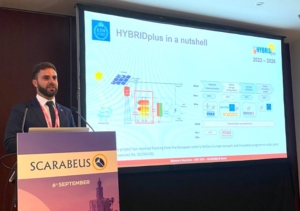
Salvatore Guccione (Royal Institute of Technology KTH, Stockholkm), invited speaker at the event
The event was well attended and the opportunity to cross sessions with ORC 2023 was very much appreciated by the attendees. The representatives of the SARABEUS partners disclosed the activities carried out in each work package during the morning sessions. In the afternoon, the invited speakers -Dr. Cristina Prieto and Salvatore Guccione- provided the attendees with very new information about recently awarded EU projects that will enable the further maturation and exploitation of the SCARABEUS technology.
If you should wish to receive the presentations delivered by the speakers, get in contact with the Dissemination Coordinator of SCARABEUS: Prof. David Sánchez (ds@us.es)
As already published on this website, the CO2OLHEAT Project coordinated by ETN Global aims to demonstrate (at TRL7) the operation of a 2 MW Waste-Heat-to-power (WH2P) skid based on a 2MW-sCO2 cycle, able to efficiently valorize local waste heat at a significant temperature of 400°C in the CEMEX cement manufacturing plant in Prachovice (CZ).
ETN Global initiated, in September 2022, a series of webinars aimed at providing a forum where the R&D activities in the area of supercritical Carbon Dioxide technologies can be disseminated and made known to a wider audience. This initiative has been joined by nine international and national projects, funded by the Horizon 2020 and Horizon Europe programmes of the European Commission (CO2OLHEAT, COMPASsCO2, SCARABEUS, DESOLINATION, SOLARSCO2OL, sCO2-4-NPP , ISOP) and by national R&D programmes in Germany (CARBOSOLA) and the Czech Republic (sCO2-Efekt).
The first webinar, held on September 22nd, aimed to introduce these projects in a single session, providing the main features of the project from technical and administrative standpoints. Opportunities for collaboration between projects and with stakeholders were also highlighted. Presentations can be downloaded from the SCARABEUS website: Link.
The second webinar took place on December 5th and presented a focus session discussing the fundamental and technical challenges posed for the design and operation of compressors in Supercritical Carbon Dioxide power systems. Three outstanding speakers covered these aspects; the session turned out very well and the feedback was very positive. Presentations can be downloaded from the SCARABEUS website: Link.
The fourth event was organised on June 12th, 14.00 – 15.30 CET, focused on heat exchanger technology, since heat exchangers are core equipment of sCO2 systems with an expectedly strong impact on Capital Costs and performance. Presentations can be downloaded from the SCARABEUS website: Link
This next event (5h in the series) will be held on September 28th , 14.00 – 15.00 CET, and will be focused on supercritical Carbon Dioxide expanders, which incorporate aspects of the past webinars such as aerodynamic design, turbomachinery seals, materials, etc. The lineup of presentations is as follows:
Download the complete agenda of the event from this link
Do not miss the opportunity to register here and book your seat for yet another very interesting event: Link
As the SCARABEUS project is reaching to an end, it is time to organise the final dissemination event in the form of an international conference. To this end, SCARABEUS has agreed to co-locate this event with the 7th International Seminar on Organic Rankine Cycle (ORC) Power Systems, held in Seville between September 4th and 6th.
The International Seminar on ORC Power Systems is organised biennially by the Knowledge Centre on Organic Rankine Cycle Technology – KCORC, the reference organisation for the dissemination of all information related to ORC technology research, development and education. KORC promotes the interdisciplinary knowledge exchange between dedicated international professionals from academia, industry, governmental agencies and policy makers, with the aim is to advance the research, development and implementation of ORC technology by means of providing relevant technical and scientific information, organizing technical conferences and workshops, fostering engineering education, and advising on proper regulation. The seventh edition of the conference is hosted by University of Seville, an SCARABEUS partner.
The SCARABEUS dissemination event will be held on Wednesday, September 7th, parallel to and jointly with the sessions of ORC 2023. This will facilitate exposure to a large number of stakeholders from different backgrounds, hence ensuring maximum outreach of the results. The event is comprised of technical presentations disclosing the main results obtained throughout the project in all the relevant scientific and technical areas as well as high-level presentations of related projects funded by the European Commission which can take exploit synergies with SCARABEUS.
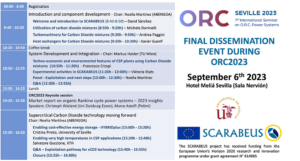
The event is sponsored by the European Commission and, hence, the registration fee is kept to a minimum, also giving access to the technical and keynote sessions of ORC 2023. More information about the event and how to register can be found on the conference website: Link
Do not miss this opportunity to interact with the consortium and get to know all the outcomes of the project!
Turbo Expo is the flagship conference in the field of turbomachinery for power generation and aircraft and marine propulsion. The conference gathers ~2500 professionals annually, who meet to share the latest development of the scientific and industrial communities through technical, panel and tutorial sessions as well as keynote talks. The conference is organized by the International Gas Turbine Institute of the American Society of Mechanical Engineers.
Turbo Expo has been one of the preferred venues to disseminate the outcomes of the SCARABEUS project, as communicated in previous years on this website, and this year has not been different.
In the first day of this year’s conference, held at the Hynes Convention centre in Boston (MA), Prof. David Sánchez organised a panel session to introduce the “Supercritical CO2 Projects in the International Community”. Seven projects funded by the Horizon 2020 and Horizon Europe programmes of the European Commission were presented in this session, followed by a very interesting panel discussion. The SCARABEUS project broke the ice, setting the stage for the other projects to complete the landscape of supercritical Carbon Dioxide research in Europe. The kind support of Eric Clementoni (Bechtel Marine Propulsion Corporation), stepping forward as improvised Co-Chair of the session due to the absence of Dr. Jason Wilkes (Southwest Research Institute) is gratefully acknowledge.
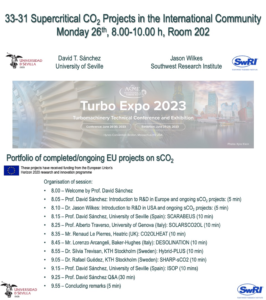
Intro slide and session schedule of panel on international Supercritical Carbon Dioxide projects
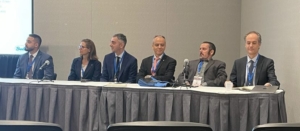
Panellists of session 31-31 (from left): Rafael Guédez (KTH), Silvia Trevisan (KTH), Lorenzo Arcangeli (Baker Hughes), Alberto Traverso (University of Genoa), Renaud Le Pierres (Meggitt), David Sánchez (University of Seville)
The main outcomes of the SCARABEUS project were also presented at another panel session, “Supercritical CO2 Research & Development”, organised by Renaud Le Pierres (Meggitt, UK), where Prof. David Sánchez (Dissemination Coordinator of the SCARABEUS project) shared the stage with distinguished speakers from Europe and North America: Vittorio Michelasi (Baker Hughes, Italy), Nathan Weiland (National Energy Technology Laboratory, USA), Aaron McClung (Southwest Research Institute, USA), Ty Neises (National Renewable Energy Laboratory). With respect to the session above, this session had a much wider scope, not only discussing today research efforts but also looking into the foreseen needs of the energy market in the future and how supercritical Carbon Dioxide technologies can possibly fulfil them.
In addition to these panel sessions, a number of technical papers were presented at ASME Turbo Expo by the SCARABEUS partners. The team at University of Seville presented a very interesting paper discussing how to optimise the design and operation of Air-Cooled Condensers to enhance part load performance with minimum impact on Capital Costs:
The team at City, University of London presented their latest research on the development of axial turbines for Carbon Dioxide mixtures. In this paper, the authors compared the impact of adding certain dopants on the flow path of large axial turbines working with Carbon Dioxide and supercritical inlet conditions:
These technical papers are currently being processed by the editorial services of ASME and will be made available in Open Access in the next months. Keep an eye on the online digital collection and on this website for further information.
With the stamp on the nameplate, the long path of commissioning the test facility is now successfully finished.
From the start of the SCARABEUS project in 2019, the team at TUW has worked very hard to make this happen. The steps involved:
all three under the guidance of the notified body in Austria (TÜV Austria).
The original test facility existing at TUW was modified to a recuperated Rankine cycle. In the first test campaign, the novel heat exchangers with pure CO2 will be examined: the recuperator (a printed circuit heat exchanger) and the air-cooled condenser – both from the project partner Kelvion Thermal Solutions. A brand new gas burner and the attached Inconel primary heater will supply the testing section of the facility us with flue gas at 850 °C and heat up the CO2 to 650 °C.
It has been a long and bumpy road due to the many hurdles arising as a consequence of the pandemic and subsequent shortage of critical supplies. Nevertheless, the team at TUW made it happen. Congratulations!
We are very glad to announce that the presentations of the 4th webinar on R&D Activities on sCO2 Activities in Europe are now available for download.
Organised by ETN Global, coordinator of the CO2OLHEAT Project, this last event was focused on heat exchanger technology, since heat exchangers are core equipment of sCO2 systems with an expectedly strong impact on Capital Costs and performance. It is to note that event was part of the European Sustainable Energy Week (EUSEW), as a Sustainable Energy Day.
These are the talks that we had the opportunity to enjoy:
Follow this link to get your copy of the presentations: Link
